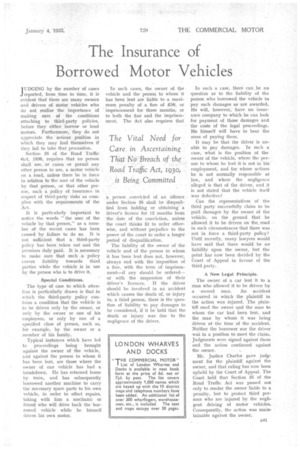The Insurance of Borrowed Motor Vehicles
Page 51

If you've noticed an error in this article please click here to report it so we can fix it.
The Vital Need for Care in Ascertaining That No Breach of the Road Traffic Act, 1930, is Being Committed
tUDGING by the number of cases reported, from time to time, it is evident that there are many owners and drivers of motor vehicles who do not realize the importance of making sure of the conditions attaching to third-party policies, before they either borrow or lend motors. Furthermore, they do not appreciate the serious position in which they may find themselves if they, fail to take that precaution.
Section 35 of the Road Traffic Act, 1930, requires that no person shall use, or cause or permit any other person to use, a motor vehicle on a road, unless there be in force in relation to the user of the vehicle by that person, or that other person, such a policy of insurance in respect of third-party risks as complies with the requirements of the Act.
It is particularly important to notice the words the user of the vehicle by that person," as a number of the recent cases has been caused by failure to do so. It is not sufficient that a third-party policy has been taken out and the premium duly paid. It is necessary to make sure that such a policy covers liability towards third parties while the vehicle is in use by the person who is to drive it.
Special Conditions.
The type of case to which attention is particularly drawn is that in which the third-party policy contains a condition that the vehicle is to be driven only by the owner, or only by the owner or one of his employees, or only by one of a specified class of person, such as, for example, by the owner or a member of his family.
Typical instances which have led• to proceedings being brought against the owner of the vehicle, and against the person to whom it has been lent, are those where the owner of one vehicle has had a• breakdown. He has returned home by train, and has subsequently borrowed another machine to carry the necessary spare partsto his own vehicle, in order to effect repairs, taking with him a mechanic or friend who will drive back the borrowed vehicle while he himself drives his own motor.
In such cases, the owner of the vehicle and the person to whom it has been lent are liable to a maximum penalty of a fine of £50, or imprisonment for three months, or to both the fine and the imprisonment. The Act also requires that a person . convicted of an offence under Section 35 shall be disqualified from holding or obtaining a driver's licence for 12 months from the date of the conviction, unless the court thinks Et to order otherwise, and without prejudice to the power of the court to order a longer period of disqualification.
The liability of the owner of the vehicle and of the person to whom it has been lent does not, however, always end with the imposition of a fine, with the term of imprisonment—if ally should be ordered— or with the suspension of their driver's licences. If the driver should be involved in an accident which causes the death of, or injury to, a third person, there is the question of liability to pay damages to be considered, if it be held that the death or injury was due to the negligence of the driver. In such a case, there can be no question as to the liability of the person who borrowed the vehicle to pay such damages as are awarded. He will, however, have no insurance company to which he can look for payment of those damages and the costs of the legal proceedings. He himself will have to bear the onus of paying them.
It may be that the driver is unable to pay damages. In such a case, what is the position of the owner of the vehicle, where the person to whom he lent it is not in his • employment, and for whose actions he is not normally responsible at law, and where the negligence alleged is that of the driver, and it is not stated that the vehicle itself was defective?
Can the representatives of the third party successfully claim to be paid damages by the owner of the vehicle, on the ground that he allowed it to be driven on the, road in such circumstances that there was, not in force a third-party policy? Until recently, many lawyers would • have said that there would be no liability upon the owner, but the point has now been decided by the Court of Appeal in favour of the third party.
A New Legal Principle.
The owner of a car lent it to a man who allowed it to he driven by a second man. An accident occurred in which the plaintiff in the action was injured. The plaintiff sued the owner and the man to whom the car had been lent, and the man by whom it was being driven at the time of the accident. Neither the borrower nor the driver was in a position to meet the claim. Judgments were signed against them and the action continued against the owner.
Mr. Justice Charles gave judgment for the plaintiff against the owner, and that ruling has now been upheld by the Court of Appeal. The Court held that Section 35 of the Road Traffic Act was passed not only to render the owner liable to a penalty, but to protect third persons who are injured by the negligent driving of motor vehicles. Consequently, the action was maintainable against the owner.




















































































